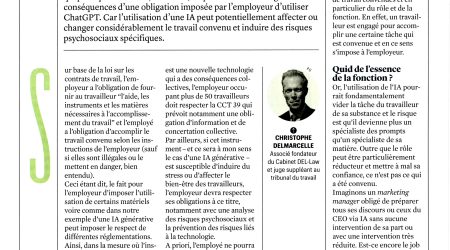What measures should be taken in view of robotization?
Posted the 14 June 2020Artificial Intelligence (AI) can be defined as the set of theories and techniques that develop complex computer programs capable of simulating certain traits of human intelligence (reasoning, learning). AI evolved in 2018 to such an extent that the latest report from McKinsey on the subject in November 2018 mentions that nearly 47% of companies were already using AI in some field, compared to 20% in 2017.
Robotization, for its part, continues its accelerated development with more than 2.2 million robots worldwide, with the perspective of doubling this number by 2023. The leading countries, such as Korea, are approaching a ratio of one robot for every ten workers (compared to 0.3 per 10 in Germany, 0.2 in the USA, or 0.1 in China).
Some estimate that over 30% of current jobs could be replaced, and this is not limited to manufacturing jobs but also includes so-called "intellectual" jobs such as accountants. According to McKinsey, the determining criteria are scalability, autonomy, and the degree of repetitiveness of the function.
Undoubtedly, the COVID-19 pandemic and the associated requirement for social distancing will accelerate this trend, as recent announcements from various companies confirm.
In labor law, in the absence of specific legislation, this evolution raises many questions.
Thus, the implementation of AI or robots within a company must be subject to prior information and consultation with the works council or the union delegation. It is also necessary to obtain an opinion from the health and safety committee, given the potential impacts on well-being at work, alongside an update to the company's overall risk prevention plan and annual action plan. In my view, developing an internal emergency plan should also be considered to address any malfunction.
As robots (for example, at company reception desks or for cleaning) can potentially record what they see and hear, it will be necessary to manage privacy issues at work and ensure compliance with GDPR. This is even more crucial if the manufacturer retains remote access, for example, for maintenance or updates. What guarantees can be given to "human" workers that everything they say in the presence of their "AI colleagues" will not be recorded, analyzed, and reused? Not to mention the personal information that robots will store in their memory to learn the tastes, habits, or behaviors of the people they encounter. This is especially true if "deep learning" processes are implemented, with shared information across robots from the same series or manufacturer. The French CNIL (National Commission on Informatics and Liberty) has already issued guidelines on this subject.
Currently, under Belgian law, the dismissal of a worker could validly be justified under CCT 109 as a result of a company reorganization following the implementation of new technology. Jurisprudence has already confirmed this, particularly in the context of unfair dismissal.
Such a dismissal would not require the employer to offer redeployment or replacement by a "human," even in a different role. Of course, we can trust those who announce (McKinsey, Accenture, etc.) that the lost jobs will naturally be replaced by others, or call for a legal framework.
Finally, the liability regime in the case of accidents or malfunctions is still unclear, as the European Commission's proposal for a semi-legal personality for robots has not yet been decided.
Similarly, the use of robots to "break a strike" is open in cases where the use of temporary workers is prohibited.
There is no doubt that the development of AI and robotization is the future, whether desirable or not. However, the upheavals they will bring, especially in society—where will the generated benefits go? Will they be distributed? Will states understand their interest in coordinating?—should be considered and regulated now.
At a time when partisan and ignorant politics are leading some politicians to decide overnight to tear down statues or close a forest, it is clearly neither on the agenda nor among the priorities of those who govern us. They, as has become a bad habit, will wake up too late to act in haste and without global reflection.
Related articles

Is an employer allowed to mandate the use of artificial intelligence tools by employees ? (Trends, 17-07-2025)

Caution if a former colleague opposed to your employer asks you to testify in their favor
